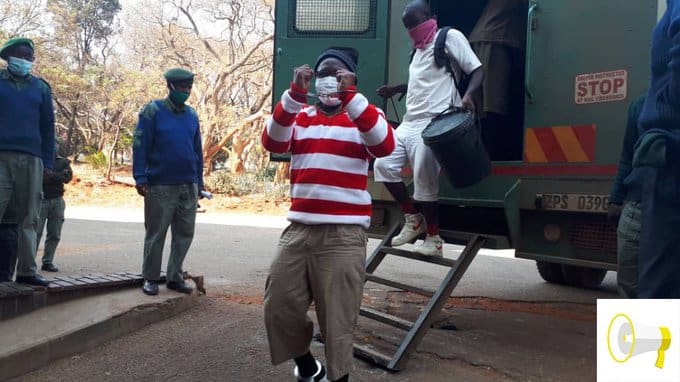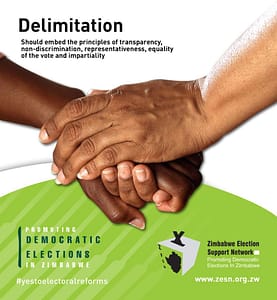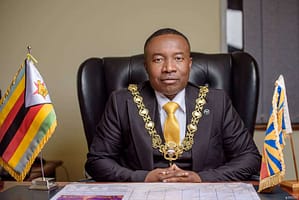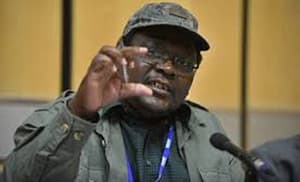Chin’ono now a figurehead of resistance, persecution

Journalist Hopewell Chin'ono
By Alex T. Magaisa
Tall, lanky, and soft-spoken, he has emerged as the unlikely figurehead of resistance to and symbol of political persecution by the regime of Emmerson Mnangagwa. This is his second stint at Chikurubi, Zimbabwe’s notorious maximum-security prison which houses the country’s most hardened criminals. He spent over 40 days at the same facility from late July to early September, charged with inciting public violence on account of a tweet on the micro-blogging site, Twitter.
When you first see him in person, you probably expect a deep and raspy voice when he opens his mouth. I have seen tall men look like dwarfs standing near him. But the soft voice belies the size of the man. However, if the vocals lack the size and command suggested by his body, he more than makes up for it in written words and perhaps more significantly, through the lens of his camera.
He never set out to be a political voice. For years, he spent his time behind the camera, documenting the lives of other people. He has always been more comfortable capturing other people’s moments behind the camera, not in front of it. This is one reason why he is the unlikely man in the limelight. Because his work has been to place others in the limelight.
I first “met” Hopewell Chin’ono around 2008. I say “met” because our meeting was through email. It was not until four years later that we first met in person, when I was a water carrier for Morgan Tsvangirai, who was the Prime Minister under the Inclusive Government. I was also a glorified gatekeeper for the hero of the opposition movement, determining who got to meet him and when. Chin’ono would come with his crew for interviews. Morgan liked him and they would engage in small talk after the formal interviews.
Our first “meeting” back in 2008 was after he had won the CNN African Journalist of the Year award for his film Pain in My Heart, which documented painful stories of the HIV/AIDS pandemic in Zimbabwe. He had also courageously documented horrendous stories of the political violence during the campaign for the 2008 Presidential run-off through his film, A Violent Response. They were powerful films.
I watched these films at a time when Zimbabwe was going through a severe economic and political crisis. The politicians were haggling over political power under the mediation of the then South African President, Thabo Mbeki. Hopewell’s films inspired me to write a story of a young girl, whom I called Tarisai who was struggling while the politicians in Harare were engaged in seemingly endless negotiations.
My article was a reminder to the politicians that the lives of vulnerable young people were in their hands. I acknowledged the inspiration and Hopewell, and I established a relationship of cordiality. I respected his work, and he respected my patch.
Over the years, we would interact and discuss issues of mutual interest, whether in groups or individually. And here again, Hopewell’s unlikely rise as a figurehead of resistance to the Mnangagwa regime becomes all too evident in an ironic fashion. Exactly three years ago we fell out. The cause of the fall out was the coup that toppled Robert Mugabe and catapulted Emmerson Mnangagwa to power. I disagreed with the coup because I did not believe it set the right precedent for Zimbabwe. I also did not believe the people who were taking over from Mugabe were any different from him.
Hopewell, on the other hand, enthusiastically welcomed the new regime. He was not alone. Thousands, if not millions of other Zimbabweans were of similar thought. I do not blame Hopewell and the many who chose to believe in the regime. People were tired of the long reign of Mugabe, which had brought social and economic misery to the country. Zimbabweans needed a break. But they were naïve to believe that Mnangagwa and his crew were sincere.
And so, began months of a cold war between us. However, the old bonds ensured that there was modus vivendi between us. We agreed to disagree, so to speak. And we rarely engaged in verbal combat because we just avoided each other. But the associations he made were disagreeable. Some of those men and women he associated with at the time are his most virulent attackers today. They are vicious in their conduct, even when the man is down.
The turning point for the man came immediately after the election. That was when Mnangagwa unleashed the military upon protestors in Harare, killing six people and injuring more than 30. He must have realised then that he had bet on the wrong horse. The men he had supported were doing precisely the same things that he had documented in his film A Violent Response, just a decade before.
Over the next weeks, Hopewell began the long retreat from the proximate position to power where he had camped. He began to reach out to old comrades. The call came via an intermediary. At first, I was hesitant because I was deeply hurt by what had happened since the coup. But eventually, I accepted his hand. For, is it not asked in the Good Book, “Who amongst us is without fault?”, to put it in paraphrase. A person who realises he is in a hole has two choices: to get out or to continue digging. Hopewell chose, wisely it must be said, to get out. And we accepted his hand to pull him out. Others, regrettably, are still digging.
It is also this early dalliance with the regime that makes Hopewell an unlikely figurehead of resistance to it. Fewer people have stood shoulder to shoulder with the people of Zimbabwe as he has done. Fewer still have said things that he has said, knowing fully well the risk that he was taking by doing so.
Hopewell knows he is dealing with a vicious and vindictive regime. He is aware of the murderous record of the men who are currently in charge of the country. He has no personal need to take the risks that he has taken. He has the advantage of a comfortable life, even in a country of Zimbabwe’s parlous circumstances. He could have chosen to remain behind the camera, doing what he loves best.
Over the last few years, he occupied himself with another excellent film, State of Mind, which documents the challenge of mental health in Zimbabwe. It is a reminder of a societal problem which demands urgent attention. One day, future generations will look back at his output and draw many lessons from it. Few of his generation can claim to have made a footprint that is indelible as he has. I believe this is the work that Hopewell would prefer to be known for, his legacy, not the label of “hero” that is used to portray him as he battled persecution by the Mnangagwa regime.
The irony of course is that this is a regime in which he invested before he realised it was a bad investment and did the honourable thing and walked away to be with the suffering masses of Zimbabwe. Hopewell’s methods may not be to everyone’s taste. And he has his critics. It is an unavoidable circumstance once one takes the public profile that he has. I have often reminded him that it comes with the territory, that he need not worry at the regular sniping from regime enablers. If they were not firing at him, it would mean whatever he was doing was irrelevant.
You hear the propaganda machine spinning myths about his latest predicament. They have planted a narrative that Hopewell has brought it all upon himself. They are even saying he broke his bail conditions, that is why he is being denied bail. Nothing could be further from the truth. I had the advantage of hearing what transpired in the Magistrates’ Court last week where he was denied bail. When the detective handling his case was asked by Hopewell’s lawyer Beatrice Mtetwa during cross examination, whether Hopewell had breached his bail conditions, he admitted that there was no breach. He confirmed that Hopewell had “abided by the bail conditions” in the previous case. It is therefore a myth that is being peddled that Hopewell is in jail because he breached his bail conditions.
For the avoidance of doubt, Hopewell’s bail conditions did not prohibit him from using social media, let alone Twitter. The relevant condition relating to social media read as follows: “The appellant shall not post on his Twitter handle, namely @daddyhope or create any new twitter account for the use to incite the holding of mass demonstrations for whatever purpose until the case against him is finished”. The condition is very specific in what it prohibits, which is why the detective could not say that Hopewell had breached his bail conditions.
It is also worth noting that the offence for which Hopewell was first arrested has since been dropped. He was charged with contempt of court, for a tweet in which he stated that Chief Justice Malaba had been seen at the Magistrates Court on the day that he was denied bail during the earlier bail hearings. It was said about allegations of judicial capture which were raised by Justice Ndewere against the Chief Justice. Why was this charge withdrawn? The reason is unclear but if that charge had gone ahead, the Chief Justice would have been called as a witness, with the possibility of him being cross-examined by Ms Mtetwa. One can only surmise that it is an experience of certain discomfort which had to be avoided.
So why is Hopewell still in jail if the original charge was withdrawn? The law enforcement authorities changed the charge after his arrest. They are now charging him with obstructing the course of justice, again for a tweet in which he announced that suspected gold smuggler, Henrietta Rushwaya would be granted bail by consent. Hopewell cited that he had received a tip-off from sources in the National Prosecuting Authority. It turned out that his report was accurate, for indeed, the prosecution had consented to bail under dubiously lax conditions.
The regime wants Hopewell to name his sources in the NPA. But if he did so, he would not only be breaking a cardinal rule of his profession, but he would be conceding his fundamental rights which are protected by the Constitution. Section 61(2) of the Constitution states as follows:
“Every person is entitled to freedom of the media, which freedom includes protection of the confidentiality of journalists’ sources of information”
Hopewell has refused to name his sources and he is right to do so. Any journalist worth his or her salt knows that it is the right thing to do. This is partly why Hopewell is not merely a victim of political persecution by the Mnangagwa regime, but he is also a symbol of defence of the rights of journalists and a free media. He might escape persecution if he named his sources, but that would be a devastating blow on the Fourth Estate. So far, he has chosen to sacrifice his liberty in defence of journalism and that is an honourable thing to do.
On Tuesday, his case comes before a High Court judge, who will hear his appeal against the denial of bail at the Magistrates Court. But it’s unlikely that the matter will be decided tomorrow. The wheels of justice turn ever so slowly in Zimbabwe, especially when the accused is regarded as a political misfit. Although, the Magistrate denied him bail last Thursday, it was not until Monday that the record became available. The State will say it needs more time to study the record. The judge will probably agree, because, he might say, he also needs time.
The Constitution of Zimbabwe says “justice must not be delayed, and to that end members of the judiciary must perform their judicial duties efficiently and with reasonable promptness”. This is forgotten when it comes to accused persons who are perceived to be critics and opponents of the regime. Administrative inefficiency, which is deliberate, is used to frustrate this constitutional rule and the accused. That is how the system operates in an authoritarian environment.
Remember the man as you dispatch your Holy petitions. Hopewell’s political persecution goes beyond the man. It has grave implications for all citizens who dare raise their voice against the regime.
–Alex Magaisa is a law lecturer at Kent University in UK




